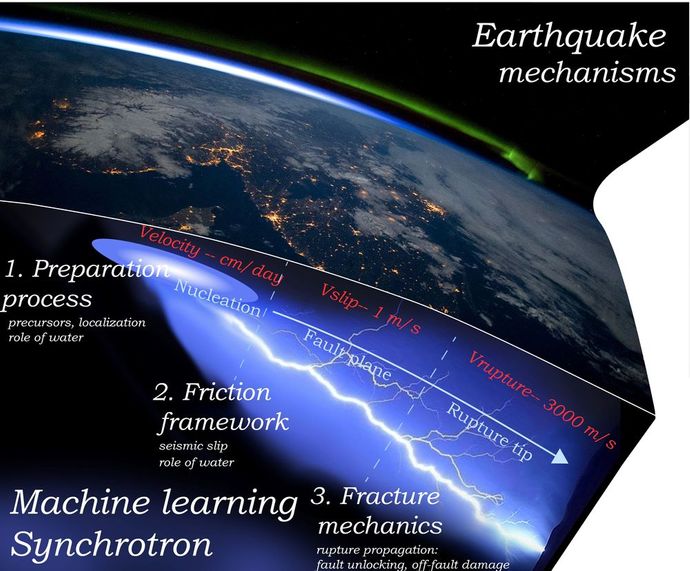When brittle materials are loaded, numerous microfractures may nucleate, grow, and coalesce before major catastrophic rupture occurs. This mechanical behavior controls the deformation of various materials such as cements, metals, ice, and rocks in the Earth’s crust where earthquakes occur. However, the origin and evolution of these microfractures are not understood and could be used to monitor and predict the occurrence of major earthquakes. Using machine learning and state-of-the-art rock physics experiments performed at the European Synchrotron Radiation Facility (ESRF, Grenoble, France), the candidate will participate to deformation experiments of rocks approaching failure (4D X-ray microtomography, acoustic emission monitoring). The participant will analyze these data using several computer science approaches, including supervised and unsupervised machine learning techniques. The work will also include numerical mechanical modelling of fracture network development. The main question will be to identify how the precursors to failure in rocks and other brittle materials localize on the future fracture plane when approaching failure and, to what extent water may control this process.
At the Njord Centre, the candidate will be supervised by François Renard, professor of Geosciences, and Dr. Jess McBeck, researcher in geophysics. The candidate will perform several short- and long-term internships at the ESRF under the supervision of Dr. Benoit Cordonnier. In addition to perform his/her main activities in the framework of CompSci, the activities of the candidate will be coordinated with those of another PhD student working in the European Research Council (ERC) project "Break-Through Rocks".
Requirements
- MSc in experimental Physics or Earth Sciences, preferably in rock physics with data processing experience.
- Candidates with documented experience in X-ray imaging and/or ultrasonic monitoring techniques will be prioritized.
- Skills in scientific programming (Python, Matlab), simulations, and experience from machine learning will be considered as important assets.
Personal skills
- Teamwork skills, as well as the ability to work independently
- Enthusiasm, personal drive, and ability to take initiative
- Attention to detail
- Flexibility and ability to meet deadlines
Supervisors
Call 2: Project start autumn 2022
This project is in call 2, starting autumn 2022.
